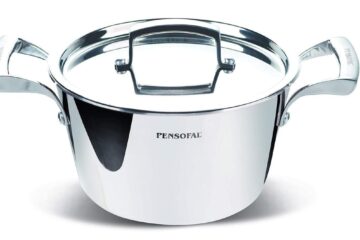Aluminum cookware is a popular choice for many households as it is affordable, durable, and conducts heat well. However, concerns have been raised about the potential link between aluminum cookware and Alzheimer’s disease. Alzheimer’s is a progressive brain disorder that affects memory, thinking, and behavior, and it is the most common cause of dementia in older adults.
Some studies have suggested that aluminum exposure may be a risk factor for Alzheimer’s disease, as the metal has been found in the brains of individuals with the disease. However, other studies have failed to find a significant link between aluminum exposure and Alzheimer’s. The topic remains controversial, and researchers continue to investigate whether or not aluminum cookware can cause Alzheimer’s disease.
Understanding Alzheimer’s Disease
Definition of Alzheimer’s Disease
Alzheimer’s disease is a progressive brain disorder that affects memory, thinking, and behavior. It is the most common cause of dementia, accounting for 60 to 80 percent of all cases. The disease is named after Dr. Alois Alzheimer, who first described it in 1906.
In Alzheimer’s disease, abnormal protein deposits, called plaques and tangles, build up in the brain, disrupting communication between nerve cells and causing them to die. This leads to a decline in cognitive function, including memory loss, confusion, and difficulty with everyday tasks.
Risk Factors for Alzheimer’s Disease
While the exact cause of Alzheimer’s disease is unknown, several risk factors have been identified. These include:
- Age: The risk of developing Alzheimer’s disease increases as people get older.
- Genetics: Certain genes have been linked to an increased risk of developing the disease.
- Head injuries: A history of head injuries, particularly those that involve loss of consciousness, may increase the risk of Alzheimer’s disease.
- Lifestyle factors: Factors such as high blood pressure, high cholesterol, and a sedentary lifestyle may increase the risk of Alzheimer’s disease.
It is important to note that while some risk factors for Alzheimer’s disease are modifiable, such as lifestyle factors, others, such as age and genetics, are not.
Aluminum and Alzheimer’s Disease
The Aluminum Hypothesis
For decades, there has been a hypothesis that aluminum exposure may be linked to Alzheimer’s disease. This hypothesis was based on the observation that high levels of aluminum were found in the brains of people with Alzheimer’s disease. However, recent studies have challenged this hypothesis and found no convincing relationship between the amount of exposure to aluminum and the development of Alzheimer’s disease.
Studies on Aluminum and Alzheimer’s Disease
Several studies have been conducted to investigate the link between aluminum and Alzheimer’s disease. One study found that there was no significant difference in the aluminum content in the brains of people with Alzheimer’s disease compared to those without the disease. Another study found that there was no evidence to support the claim that aluminum exposure from cookware or other sources increases the risk of Alzheimer’s disease.
While these studies suggest that aluminum exposure is unlikely to cause Alzheimer’s disease, it’s important to note that excessive exposure to aluminum can lead to other negative health outcomes. For example, excessive aluminum exposure has been linked to bone disorders, kidney problems, and anemia.
Cookware and Aluminum Exposure
Aluminum is a commonly used metal in cookware due to its excellent heat conductivity and affordability. However, concerns have been raised about the potential health risks associated with aluminum exposure, particularly in relation to Alzheimer’s disease. In this section, we will explore the different types of aluminum cookware, cooking methods that can affect aluminum exposure, and other sources of aluminum exposure.
Types of Aluminum Cookware
There are several types of aluminum cookware available on the market, including:
- Bare aluminum: This type of cookware is made from untreated aluminum and is highly reactive with acidic or alkaline foods. It is not recommended for cooking acidic foods like tomatoes or citrus fruits.
- Anodized aluminum: Anodization is a process that creates a hard, non-reactive surface on aluminum cookware. It is a popular choice for cookware as it is durable and non-stick.
- Ceramic-coated aluminum: This type of cookware has a ceramic coating that provides a non-stick surface and is less reactive than bare aluminum.
Cooking Methods and Aluminum Exposure
Cooking methods can also affect the amount of aluminum that leaches into food. Here are some tips to minimize aluminum exposure while cooking:
- Use non-aluminum cookware for acidic foods like tomatoes and citrus fruits.
- Avoid cooking with high heat as this can cause aluminum to leach into food.
- Use non-abrasive cleaning methods to avoid damaging the surface of the cookware, which can increase aluminum leaching.
Other Sources of Aluminum Exposure
Apart from cookware, there are other sources of aluminum exposure, including:
- Processed foods: Some processed foods contain aluminum additives as a preservative or stabilizer.
- Drinking water: Aluminum can be present in drinking water, particularly in areas with high levels of aluminum in the soil.
- Cosmetics: Some cosmetics, particularly antiperspirants, contain aluminum compounds.
While low-level aluminum exposure from cookware, food, and drinking water is believed to be unlikely to increase the risk of Alzheimer’s disease, it is still important to minimize exposure where possible. Using non-reactive cookware, avoiding high heat, and being mindful of other sources of aluminum exposure can help reduce the risk of aluminum toxicity.
Other Factors That May Contribute to Alzheimer’s Disease
Aluminum cookware has been a topic of concern for many years, with some studies suggesting a link between aluminum exposure and Alzheimer’s disease. However, Alzheimer’s disease is a complex condition with many contributing factors beyond just aluminum exposure. Here are some other factors that may contribute to Alzheimer’s disease:
Genetics
A person’s genetics can play a significant role in their risk of developing Alzheimer’s disease. Researchers have identified several genes that may increase a person’s risk, including the APOE gene. However, having a genetic risk factor does not necessarily mean a person will develop Alzheimer’s disease.
Environmental Factors
Exposure to certain environmental factors may also increase a person’s risk of developing Alzheimer’s disease. For example, air pollution and pesticide exposure have been linked to an increased risk of Alzheimer’s disease. However, more research is needed to fully understand the relationship between environmental factors and Alzheimer’s disease.
Lifestyle Factors
Lifestyle factors such as diet, exercise, and sleep can also impact a person’s risk of developing Alzheimer’s disease. A diet high in processed foods and sugar may increase the risk, while a diet rich in fruits, vegetables, and healthy fats may help protect against Alzheimer’s disease. Regular exercise and good sleep habits may also help reduce the risk.
Conclusion
In summary, the question of whether aluminum cookware causes Alzheimer’s disease remains an area of ongoing research. While early studies suggested a link between aluminum exposure and the development of Alzheimer’s, subsequent research has not found conclusive evidence to support this claim.
Current research indicates that the amount of aluminum leached from cookware is generally considered to be minimal and is unlikely to cause harm to most people. However, it is important to note that individuals with kidney disease may be more susceptible to aluminum toxicity due to impaired kidney function.
Overall, the best way to minimize potential exposure to aluminum from cookware is to use non-aluminum alternatives such as stainless steel, cast iron, or ceramic. Additionally, individuals can reduce their exposure to aluminum by avoiding the use of aluminum foil for cooking or storing food, and by limiting their intake of processed foods that may contain aluminum additives.
It is important to note that Alzheimer’s disease is a complex condition with many potential contributing factors, and it is unlikely that any single factor can be solely responsible for its development. As such, it is important to continue researching the potential link between aluminum exposure and Alzheimer’s disease, while also exploring other potential causes and risk factors.



